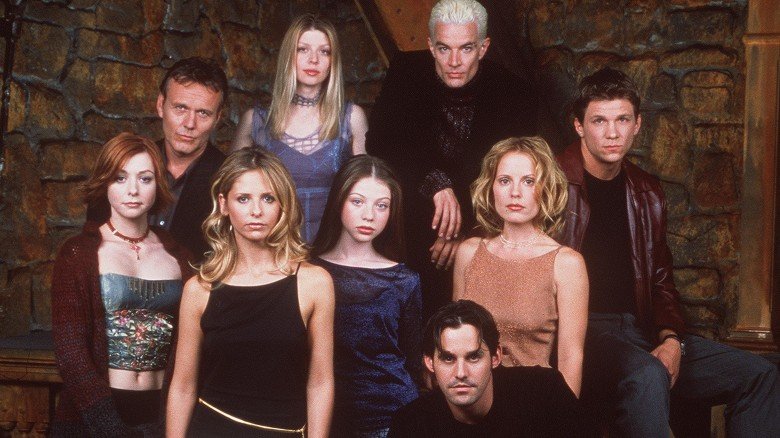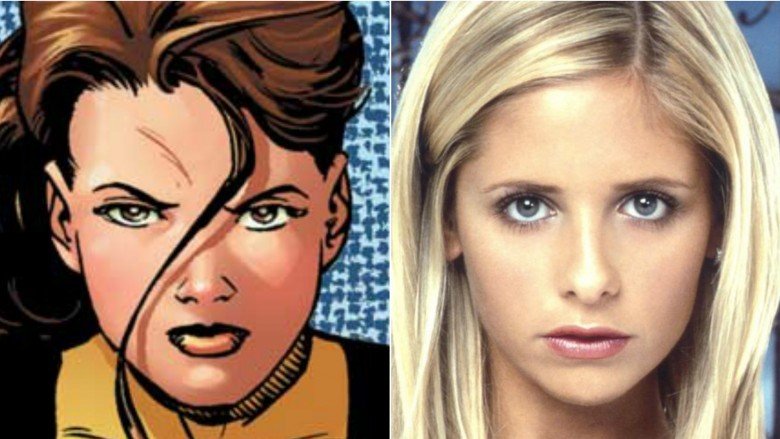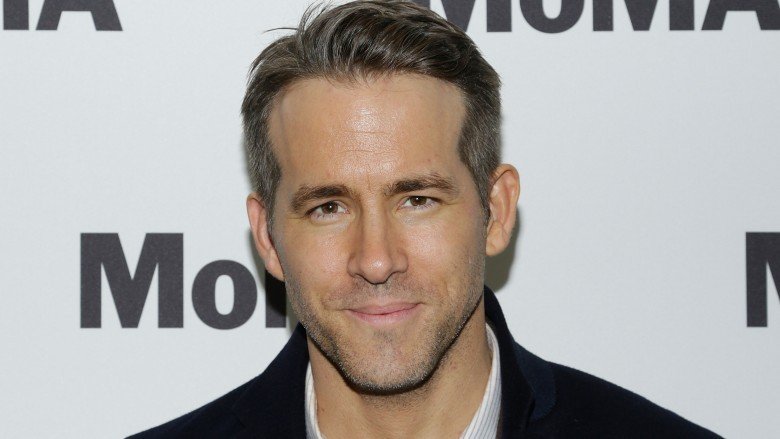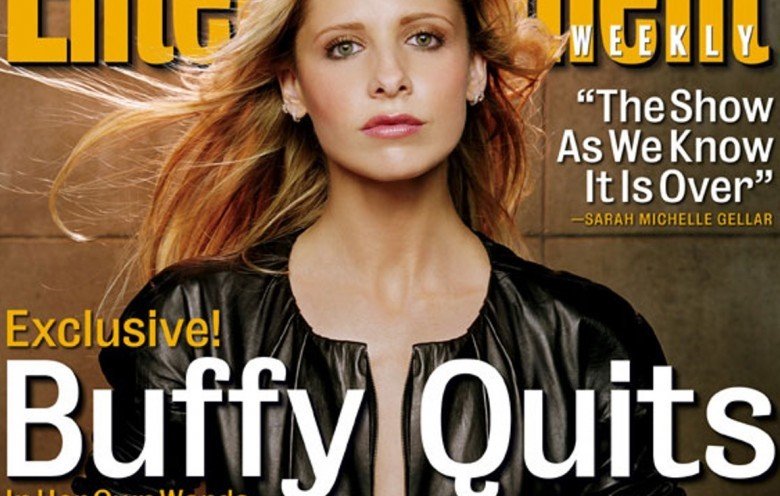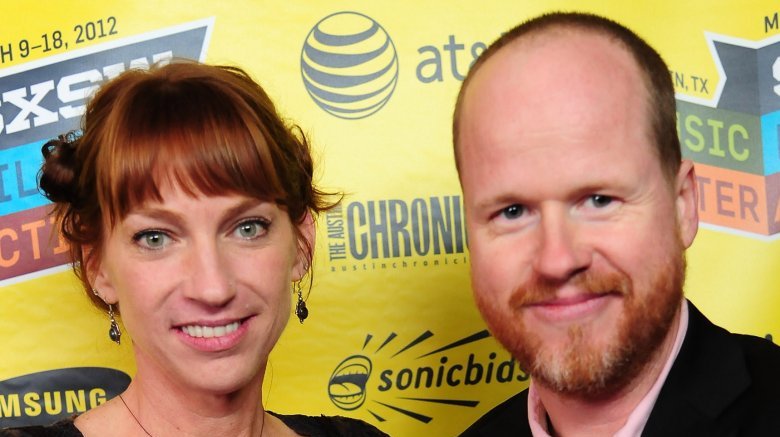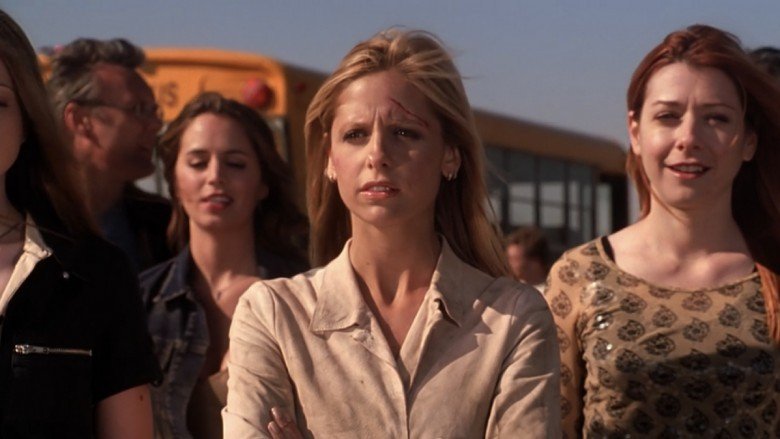The Untold Truth Of Buffy The Vampire Slayer
We may receive a commission on purchases made from links.
The legacy of Buffy the Vampire Slayer is immense. The show changed TV's gender norms, redefined youth-oriented television, and launched a generation of heroines who continue to shine. However, the path wasn't necessarily always clear for the innovative show, which faced many a roadblock on its way to the small screen—and even more after it arrived. This is the untold truth of Buffy the Vampire Slayer.
The non-canon movie
Let's get this out of the way up front: the 1992 movie on which Buffy the Vampire Slayer is based isn't great. If it weren't for the TV show that followed, the Kristy Swanson-starring flop would have been quickly and quietly forgotten, fading away into the background of D-rated horror movies that you find after a few too many hours in a Netflix spiral.
So how did the story get a second act? Flash back to 1989, when young Joss Whedon is working as a staff writer on Roseanne, where he is, by his own admission, bored. He's a staff writer, the lowest position in the writer's room, and he only gets to write a few scripts a season, leading him to pursue an outside project: Buffy. The idea came from a picture in Whedon's head of the pretty blonde girl in a horror movie who always walks into an alley and gets killed. "I felt bad for her, but she was always more interesting to me than the other girls," he told Rolling Stone. "She was fun, she had sex, she was vivacious. But then she would get punished for it. Literally, I just had that image, that scene, in my mind, like the trailer for a movie— what if the girl goes into the dark alley. And the monster follows her. And she destroys him."
While Swanson was an apt enough Buffy, the movie was hampered by some of its supporting cast, particularly Donald Sutherland, who played the Slayer's original watcher, Merrick. According to Whedon, Sutherland was awful to work with on set, frequently changing his lines and just generally having "a very bad attitude" on set. That, coupled with the fact that director Fran Rubel Kuzui had a different vision for the film, made the project uncomfortable for Whedon to work on.
"I've never had a worse experience in my life, and I've often thought of doing a lecture series on how to make movies based on just showing that movie, because I think they literally did every single thing wrong," he told The AV Club in 2001 of the experience. "The production design, the casting, there wasn't a mistake they left unturned... I literally didn't see any of it again until I saw the director's cut, during which I actually cried... I said, 'I can't believe this.' I was heartbroken."
The idea to make the movie into a TV show came from Gail Berman, who owned the rights to the movie and approached Whedon about turning it into a show instead. Realizing they had similar ideas, the two crafted a pitch they presented to FOX and NBC. Both networks rejected the show, but it ended up finding a home on the upstart network the WB, who ordered a presentation from the pair, but not a pilot. They eventually ordered the show as a midseason replacement—and the rest, as they say as history.
The Buffy movie didn't fare well in theaters and it isn't considered canon by fans of the show, but it did help to launch the careers of quite a few famous actors. Academy Award winner Hilary Swank counts Buffy as her first film credit, and the movie also offered early parts for David Arquette, Thomas Jane, Luke Perry, and Ben Affleck. Seth Green, who would go on to appear on the Buffy series as fan favorite Oz, also had a small role as a vampire.
X-Men origins
Joss Whedon's comic book fandom would become pretty apparent in the years after Buffy the Vampire Slayer, when he went on to pen multiple Marvel comics and direct The Avengers and Avengers: Age of Ultron, as well as co-create Agents of S.H.I.E.L.D. However, it turns out that Whedon's Marvel inspirations go back even further, as it was a member of the X-Men who inspired Buffy in the first place.
According to Whedon, Kitty Pryde, the teleporting teen played by Elliot Page in the X-Men film franchise, brought quite a lot to Buffy Summers. "Kitty was the mother of Buffy, as much as anybody," he told Wired. "If there's a bigger influence on Buffy than Kitty, I don't know what it was," he elaborated to New York. "She was an adolescent girl finding out she has great power and dealing with it." He also added to Time that there was "no other you could point to as strongly" as a Buffy influence.
Whedon was such a big Kitty fan that he brought the character back into the main fold of the X-Men comics with Astonishing X-Men, and he's previously said that, should Page ever get her own movie as the character, he would definitely be down to direct. Hey, as long as he treats Kitty better than he did Buffy's real mother, we're okay with it. (Too soon?)
Casting shake-ups
Casting for Buffy the Vampire Slayer, as for any show, was a tough process, and it required quite a few ups and downs in order to find the right people for the parts. Sarah Michelle Gellar had some stiff competition when it came to landing the lead, and at first, she didn't even put herself in the running. Gellar first auditioned for mean girl Cordelia, according to casting directors. Charisma Carpenter, meanwhile, is said to have gone out for Buffy first, but ended up winning the role of Cordelia after Bianca Lawson (who would go on to play Kendra) was reportedly forced to turn it down due to scheduling issues.
Julie Benz (Darla), Elizabeth Anne Allen (Amy), and Mercedes McNab (Harmony) are all also said to have gone out for the title role, as are Katie Holmes (who allegedly turned down the part so she could go to real-life high school), Selma Blair (who would go on to have a memorable scene with Gellar in Cruel Intentions), and even Natasha Lyonne, who has confirmed that she turned down a Buffy role and implied that it was the Slayer. Gellar ultimately ended up getting the part after producers reconciled her "different" take on Buffy with the Buffy from the movie. "It took us a while to come around to Sarah being Buffy and it was a different Buffy but it was clearly a Buffy," said casting director Marcia Shulman.
Willow provided an even tougher challenge for casting directors, and they ended up not getting it right the first time around. Sisters star Riff Regan was cast as Buffy's BFF in the show's unaired pilot, but casting directors pretty quickly recognized that she wasn't right for the role. "The qualities that Willow had to have are the exact opposite qualities of what actress have to have... sort of insecure, shy, self-effacing," said Shulman. "Every line that somebody else would play like they were sad, Alyson [Hannigan, who ended up getting the part] was joyful about. It made her the only one for the role."
Ryan Reynolds, who would later become a mega-star, says he was offered a role in Buffy when he was just starting out, but he ended up turning it down because he didn't want to play a high schooler. While he hasn't said which role it was, many speculate he was up for Nicholas Brendon's Xander. However, casting directors seem pretty happy to have landed Brendon, saying that they knew he was right for the role as soon as he walked into the room. Danny Strong, who would go on to play Jonathan, is also rumored to have gone out for Xander.
Angel also presented a huge challenge due to his mysterious nature. Casting directors said they saw just about every guy in town (including, reportedly, Firefly's Nathan Fillion), but they just couldn't find the right person for the part. Luckily, Shulman's friend called and said she had a neighbor she always saw walking his dog who seemed to fit the description perfectly. "The minute [David Boreanz] walked in the room, I wrote down on my notes, 'this is the guy,'" said Shulman.
As for Giles, Anthony Stewart Head ended up being perfect for the part immediately. He was the first actor to audition on the first day of casting, and producers said "he was just it." The character wasn't initially pictured as British, but Head's accent fit well enough with the character description that they decided to keep it.
Buffy-speak
Buffy the Vampire Slayer's signature quick-witted dialogue has been mimicked in countless series to follow, and it even inspired its own language, Buffy-speak, which has become famous enough to get its own book, its own blog post on the Oxford English Dictionary's website, and, yes, even its own page on TV Tropes.
Buffy's reliance on clever dialogue is interesting when held up against one of the series' best episodes, "Hush," which contained barely any dialogue at all. Joss Whedon wrote the episode to challenge himself, but it also provided quite a challenge for the actors. "Joss' scripts were always something that you'd look forward to getting," said Anthony Stewart Head. "And the fact that this came through not as a script, but as a beat sheet—because of course there was no script initially. He just ran through the ideas that basically broke down into the beats of the episode, which is unheard of." However, the episode ended up being a hit, earning the show its only major Emmy nod for Whedon's script.
The Cheese Man
One of the most bizarre Buffy the Vampire Slayer episodes was the season four finale "Restless," which took place almost entirely in the dreams of the main characters, all of whom were tied together by the mysterious force chasing them... and by a middle-aged bald man carrying an inexplicable number of individual cheese slices. Whedon has insisted that the Cheese Man, who he's called one of his favorite characters of all time, has absolutely no meaning whatsoever, saying on the season four DVD commentary that the Cheese Man was just there "because there is always something in the dream that just doesn't make sense at all. ... He confounds everybody because of that, and people ascribe him meaning."
Of course, Whedon's comments haven't stopped loyal fans of the show from analyzing the heck out of the bizarre character, with many theorizing that the way in which the Cheese Man pops up in each character's dream is actually some kind of metaphor for their lives (and their future). Whether you were willing to write Cheese Man off as a one-off joke or felt the need to fully investigate his appearance in a lengthy blog post, you can't deny he's hilarious.
Willow's lesbian arc
Willow got one of the most compelling (and revolutionary) arcs on Buffy the Vampire Slayer. The character was part of one of the first lesbian relationships on the small screen, something which can be at least partially attributed to Seth Green's burgeoning movie career. Green, who played Willow's boyfriend Oz, left the show earlier than anticipated, and, although Whedon says the idea of making Willow (or, rumor has it, Xander) gay was "out there" before his departure, it was his departure that pushed them to make that decision. "We thought, how do you follow Oz?" he told Salon. "People loved the s— out of him, though they hated him when he first arrived. The one romance that we could give her that would really affect people in a new way would be with a woman. We didn't know how far we were going to go with it."
Whedon chose to make Willow's new romantic partner, Tara, a witch, so their relationship could be a metaphor for their powers. "It's very physical, it's very romantic, it's very private," he said, noting that, at first, they were accused of playing it coy with the pair's budding relationship. "We decided, yeah, these two have real chemistry and this is clearly a romantic relationship and there's no reason not to physicalize it because it means we will get a lot of really funny hate email."
Tara and Willow finally showed the physical part of their relationship on screen in "The Body," an episode best remembered for the brutal death of Buffy's mom Joyce. Whedon says that, when he first pitched the relationship to the network, they said no to kissing, and reports say they tried to nix the kiss from the episode too, but Whedon threatened to leave. (Willow would also later go on to be involved in the first lesbian sex scene on TV with her new girlfriend Kennedy in the season seven episode "Touched.")
Willow's relationship with Tara ended tragically, resulting in the controversial season six arc in which Willow retaliates against Warren (and the world) after he shoots and kills Tara. For fans who want some additional heartbreak, the script for the episode apparently said in the action lines that "This is a true love, forever."
Gellar spoils the ending
Sarah Michelle Gellar picked a pretty interesting way of announcing she was planning on leaving Buffy the Vampire Slayer. The actress took to the cover of Entertainment Weekly to announce her departure to the world, stunning her castmates. "The day that the Entertainment Weekly cover came out— that was the day we all found out Buffy was over," Hannigan later told EW. "I was devastated. I was just very shocked."
This omission caused a rumored feud between Hannigan and Gellar, which appears to be now completely swept under the rug, as Gellar thanked Hannigan in an Instagram post about the show's 20th anniversary. However, for a while there, it appears to have been pretty dicey between the two, with Hannigan even alleging on Watch What Happens Live that Gellar checked out of the show after season three. "She had a big career going," she added. "It was a lot of work." While it would be awful if Gellar truly did announce the end of the show without telling her castmates, we're glad everything seems to be patched up now.
Creator controversy
Kai Cole, who was married to Whedon for 16 years, alleged in an August 2017 guest blog for The Wrap that throughout his career, he had multiple affairs with "actresses, co-workers, fans and friends," the first of which took place on the set of Buffy the Vampire Slayer. According to Cole, Whedon admitted at the end of their marriage, "I was surrounded by beautiful, needy, aggressive young women. It felt like I had a disease, like something from a Greek myth. Suddenly I am a powerful producer and the world is laid out at my feet and I can't touch it."
Cole, who said she was kept in the dark about her husband's infidelity until their marriage ended, accused him of using their relationship as a shield. "Despite understanding, on some level, that what he was doing was wrong," she wrote, "he never conceded the hypocrisy of being out in the world preaching feminist ideals, while at the same time, taking away my right to make choices for my life and my body based on the truth."
Cole said she felt she had to tell people the truth so women would know Whedon "is not who he pretends to be," adding, "I want the people who worship him to know he is human, and the organizations giving him awards for his feminist work, to think twice in the future about honoring a man who does not practice what he preaches."
Whedon's reps said the post included "inaccuracies and misrepresentations," but whether everything she wrote is true, it represents a worrisome wrinkle in Buffy's history.
Revival?
A Buffy the Vampire Slayer revival has been on fans' minds since the show went off the air, and it became even more of a conversation after the show's 20th anniversary. Unfortunately, the show's creators and stars don't seem to think it's going to happen anytime soon.
Sarah Michelle Gellar implied she's not interested, telling The Hollywood Reporter that she hopes that, "for her sake," Buffy is "somewhere on a beautiful beach located far away from any Hellmouth." She also said that she wasn't sure how the show's use of high school and college as a backdrop for making real demons metaphors for emotional ones would translate into adulthood. David Boreanz has given an even more definitive no, telling Parade, "I'm not a big reunion guy. I tend to like to go forward." Nicholas Brendon, Anthony Stewart Head, Charisma Carpenter, James Marsters, and Amber Benson all expressed doubts about a revival in an interview with THR, but suggested that, if Whedon were involved, they could get behind it—while Eliza Dushku suggested forgoing a revival entirely and instead following one of the many girls who was imbued with Slayer powers in the finale.
The key for everyone, however, is Whedon. As the creator, it'd be his say that would give it a chance to make a return. In an interview with THR, Whedon wouldn't say yes to a revival, but he also didn't give an explicit no. "I see a little bit of what I call monkey's paw in these reboots," he said. "You bring something back, and even if it's exactly as good as it was, the experience can't be. You've already experienced it, and part of what was great was going through it for the first time. You have to meet expectations and adjust it for the climate, which is not easy... You don't want that feeling that you should have left before the encore. I don't rule it out, but I fear that."
